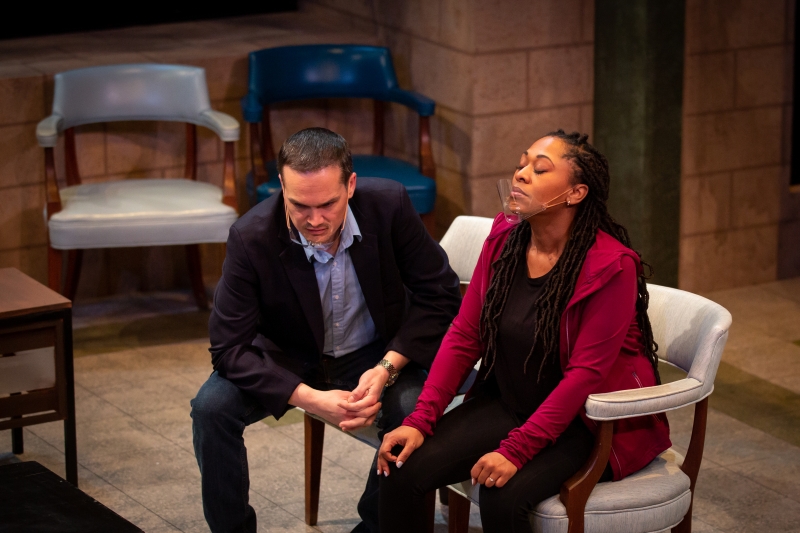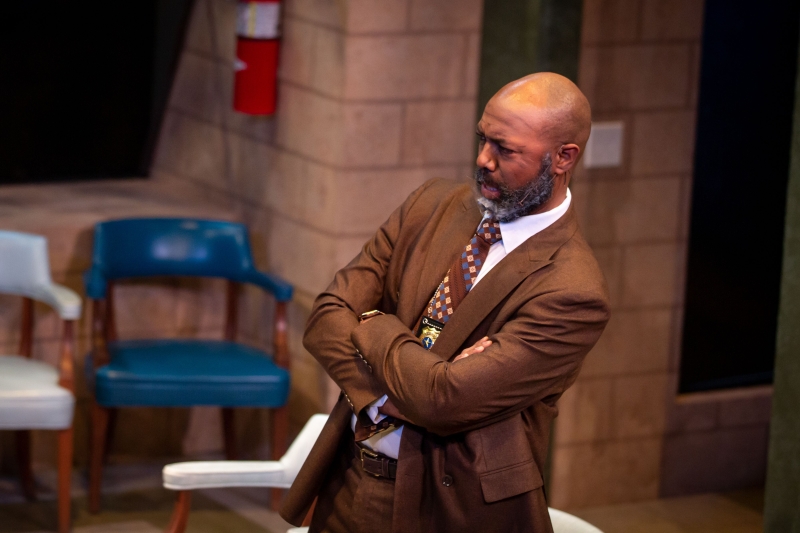Review: AMERICAN SON at Theatre Memphis
Painfully Poignant and Profound
 Between 24-hour news and omnipresent social media infiltrating our every waking hour, it would seem that we are talking more about race in 2022 than ever before. Weren't we supposed to have moved past all of this by now? The race riots of the 1960's, Jim Crow, segregation was history, wasn't it? America just elected a woman of color to be Vice-President and an African American man to be president--twice! Haven't we evolved? Yet, many could rightly argue things haven't really changed that much, and in fact, it's only BECAUSE of 24-hour news and social media that Whites in America are finally getting to see what's really been happening all along--the unadulterated discrimination, bigotry, and murder of Black Americans. With the advent of cell phone cameras and the willingness to pull them out and start recording at a moment's notice, people of color finally have evidence to prove just how insidious and pervasive the problem continues to be. If you're one of those who are sick and tired of hearing/thinking about race, then AMERICAN SON at Theatre Memphis should be required viewing as it perfectly (and respectfully) takes the time to guide you through the stress, anguish, and fear of being a person of color in these "United" States of America in the 21st Century.
Between 24-hour news and omnipresent social media infiltrating our every waking hour, it would seem that we are talking more about race in 2022 than ever before. Weren't we supposed to have moved past all of this by now? The race riots of the 1960's, Jim Crow, segregation was history, wasn't it? America just elected a woman of color to be Vice-President and an African American man to be president--twice! Haven't we evolved? Yet, many could rightly argue things haven't really changed that much, and in fact, it's only BECAUSE of 24-hour news and social media that Whites in America are finally getting to see what's really been happening all along--the unadulterated discrimination, bigotry, and murder of Black Americans. With the advent of cell phone cameras and the willingness to pull them out and start recording at a moment's notice, people of color finally have evidence to prove just how insidious and pervasive the problem continues to be. If you're one of those who are sick and tired of hearing/thinking about race, then AMERICAN SON at Theatre Memphis should be required viewing as it perfectly (and respectfully) takes the time to guide you through the stress, anguish, and fear of being a person of color in these "United" States of America in the 21st Century.
Under the impressive directorial debut of Jared Thomas Johnson, AMERICAN SON chronicles one night in a Miami police station in which a Black mother and her estranged White husband desperately try to get the details of where their missing 18-year-old son might be. Having to interact with a novice White cop and a somewhat jaded Black lieutenant, interpersonal dynamics explode as a Rubik's Cube of interactions lay bare racial stereotypes, gender discriminations and previously unspoken fears. While the central topic remains constant (what happened to this half White, half Black young man named Jamal), how an older Black mother and a younger White cop discuss the matter compared to a White father and older Black officer are as different as, well, night and day.
Written by playwright Christopher Demos-Brown (who happens to be white), this one-act play takes the time to really expose the harsh, complicated realities of what it means to deal with race on a daily basis. Whether it's to be an anxious woman of color trying to safely raise a son in a county where only his blackness is seen despite having a White father; or the unrealistic expectations of a White father trying to guarantee his "half Black" son a success in life by placing him around almost exclusively people of "no color;" or the ignorant fumblings of a novice White cop who has never taken the time nor would have the ability to view the world through a mother's eyes or recognize his own innate bigotry; or, finally, the seasoned African American officer who has personally experienced the pain of racism, but also understands the eternal dread of walking up to a stopped car from behind not knowing if a gun will be there to greet him when he gets there. Despite all their differences, these characters all have one glaring attribute in common: Terror. It's a terror so ingrained that to deny it or even to try and change it, would be foolish. But it's also a terror that, mixed with others in a similar situation, can spell doom.
Technically, Theatre Memphis is still the best in town and Jack Nezel-Yates' set is superb. All his designs are unique and expertly replicate whatever world the actors need to inhabit. Here, he creates a believable Miami police station waiting room with a large slanting window as a backdrop to expose the transparency of the internal and external lives of a divided America. Mandy Kay Heath's lighting design nicely supports the piece without distraction and offers the occasional adrenaline inducing red and blue siren lights from the wings. Even sound designer Joe Johnson impressively provides realistic sound effects at just the right time such as cell phone text alerts that are not overly amplified for the stage-it's a nice touch.

As the White, bumbling police officer Paul Larkin, Ryan Gilliam is convincingly devoid of self-awareness. While not being overtly hostile, his inability to recognize and address the increasing panic in the room of the two parents frantically searching for answers is just as annoying to witness as it must be for the characters to experience in the show. Say something important or get out of the way already!

Marcus Cox as Lieutenant John Stokes brings a much-needed gravitas to the piece as he finally enters midway through to try and quell the escalating emotions via every device at his disposal. He presents a profoundly unique experience as an African American man who has devoted his life to law and order-a life that means sometimes being called an "Uncle Tom" by the very people he's trying to protect. His character is the only one in the room who can offer the perspective that sometimes White people are ignorant racists while, at the same time, some Black people do indeed commit crimes. Cox's portrayal of Stokes demands respect for the career chosen and condolences for the pain endured.

Kinon Keplinger portrays the frustrated father (Scott Connor) to his missing son Jamal and soon-to-be ex-husband to his wife, Kendra. He's a man who had a plan to get his "non-white" son through the pitfalls of American life and exasperated that no one else appreciated just how difficult that just might be. While denying that he refers to his son as "Jay" instead of calling him by his full name to hide his blackness, Keplinger's character never shows signs of truly celebrating his son's heritage or teaching him how to be a proud Black man. Instead, it would seem more time was spent in immersing his son in White culture and warning Jamal of the dangers of driving while Black. Keplinger is fully convincing as man reeling out of control weighed down by the fallacy that he could shield his family from racism.

Carrying the heaviest load (both figuratively and literally) is Jessica "Jai" Johnson as Jamal's desperate mother, Kendra. She never leaves the stage and must endure the anguish of a mother looking for her son who simply wants answers. She understandably wants to know where her son is and if he's okay-two things no one seems to be willing to tell her. She's quickly dismissed by the younger cop as an overreacting, angry Black woman and lectured to by her know-it-all White husband in the face of agonizing worry. Johnson powerfully straddles the line between ever-declining self-control and rage as she seeks information. She's at her best in her scenes with Keplinger as they both unleash on each other about their failures as parents, spouses and being a mixed-race couple in America. Johnson masterfully articulates the 24/7 nightmare an African American mother in this country experiences in simply trying to keep her child safe from would-be racist tormentors. It's a brutal pain brought to the surface that everyone White person in Memphis should witness and hold sacred.
AMERICAN SON is a raw, ugly, painful night at the theatre. It's also needed. More like a punch in the gut than a catharsis, it serves as stark reminder that nothing in the world is truly "black" or "white" or even "gray." No, it's actually black AND white AND gray. It's good and bad. It's happy and sad. It's all the above. America is called the melting pot for a reason. A Black wife and a White husband don't have a gray child. They have a child who is Black and White, but in the eyes of most, he's simply Black. Regardless of how he was created, he will have to live in a world that wants to label him and quickly put him in a box, for simplicity. But things are never that simple. It's complex. Early in the play, Kendra reminds her husband that the name Jamal is Arabic for beautiful. While most of the play is about Jamal, we never see him. We just hear about him. He's a young man trying to find himself as he teeters between what it means to represent two cultures. He's the product of two Americas. He's our collective son, which in turn, automatically makes him beautiful.
Now through February 20, 2022
Photos by Carla McDonald
Reader Reviews

Videos

